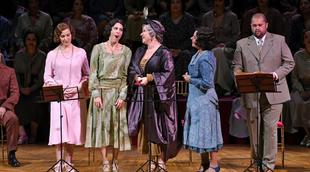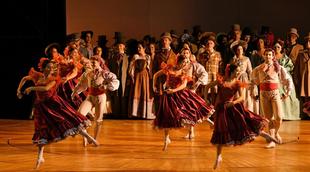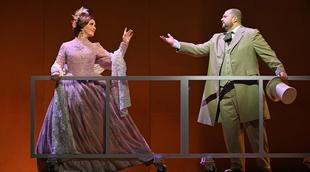 © (c) A. Bofill
© (c) A. Bofill
It is not easy to explain what Doña Francisquita is, what it represents, or bring some clarity to the huge weight of the various connotations hanging on this title to the extreme of almost crashing it and making it impossible.
To begin with, Doña Francisquita – premiered in Madrid in 1923 – is not an opera but a zarzuela, meaning a musical piece which, as in the German signspiel, combines spoken and sung parts. Moreover, Doña Francisquita, is Catalan composer Amadeu Vives’s (1879 – 1932) masterpiece. Following the foundation of Orfeó Català, one of the most prestigious musical institutions in Catalonia linked from its origins to the political Catalanism movement, decided at the beginning of the 20th century to develop his professional activity in Madrid. This was a ‘betrayal’ which in Catalonia many didn’t ever forgive. This might be hard to understand in Europe, but in the context of the ‘difficult’ relations between Spain and Catalonia this is easily understandable. To aggravate the issue, Doña Francisquita is amongst other things an impassionate exaltation to the city of Madrid and its people. Every five minutes one character or other calls “viva Madrid!” or something similar. Not even Paris or Vienna, both cities which are proud of themselves and have a long musical tradition, have a similar dedicated piece.
To highlight even more connotations, zarzuela in general, as with flamenco or corridas, was a cultural refuge of the Franco’s regime to show with pride to the Spanish population the originality and singularity of a Spain which, dominated by a dictatorship, lived with its back turned to Europe in all respects.
With the passage of time, zarzuela was progressively put away and whilst theatre and opera were renovated with new movements with a mixture of good moves and mistakes. Zarzuela became more and more a haven for those who yearned with nostalgia for old splendours and who, in a grave error, defended certain supposed ‘purities’ when thankfully theatre is one of most fertile ‘impure’ forms of artistic expression.
In this quickly drawn context, arrives the coproduction project of Doña Francisquita by Madrid’s Teatro de la Zarzuela, which as the name points out is one of the ‘temples’ of zarzuela, the Gran Teatre del Liceu and L’Opéra de Lausanne. The stage direction was entrusted to Lluís Pasqual, a Catalan stage director with ample operatic experience who has worked across Europe.
Pasqual’s proposal is complex. To start with, he has eliminated the spoken parts, which have been substituted by a narration of an actor, an excellent Gonzalo de Castro, with completely new texts. In order to avoid it becoming a concert version of the opera with narrator, the first act is set in 1934 in a recording studio where a recording of the piece is taking place. The second act takes place in a television set in 1964, the time when in the height of Franco’s regime live broadcasting of zarzuelas on television were common. The third act is set nowadays in the course of a dress rehearsal in a theatre.
In the middle of this, a wink from Pasqual: the suppression of the spoken parts is always the result of a phone call from a Spanish government minister, a reference to the clear intrusion of political power in cultural life, an intrusion which Pasqual has had to suffer personally more than once in his professional life.
Theatrically, the proposal works, the action flows smoothly and easily and dusts the piece, a happy little comedy, sentimental and funny, with a happy ending. It is based on a play by Lope de Vega, which in turn is inspired by a story from The Decameron by Boccaccio, which in the plot vaguely reminds us of Donizzetti’s Don Pasquale.
Musically, the performance at Liceu reached a very high level. Tenor Celso Albelo and soprano María José Moreno were both splendid in the star roles of Fernando and Francisquita, two greatly demanding roles vocally which were delivered with easy and well-rounded high notes, ease in the vocal lines and great knowledge of the style. Tenor Alejandro del Cerro and mezzosoprano Ana Ibarra were also very good in the roles of Cardona, Fernando’s friend, and Aurora “la Beltrana”, an actress who also pretends Fernando’s love. María José Suárez and Miguel Sola delivered with sufficiency two secondary roles, those of Doña Francisca and Don Matías. Isaac Galán did quite well in the role of Lorenzo, Fernando’s rival.
In the third act we were in for a treat. Very well presented in the dramaturgy, which brought it to stage in a completely logical manner, we enjoyed the performance of Lucero Tena, an authentic flamenco legend who, at 81 years of age, interpreted masterfully the soloist castanets part of the famous Fandango, one of the most well-known parts of the piece.
Liceu’s choir was sensational singing a piece that it knows and loves profoundly and young conductor Óliver Díaz and obtained a notable result from the orchestra. Most importantly, he conducted taking care of the singers, and of the ensemble, and looking for lightness, which is the most suitable approach to the soft music of Doña Francisquita.
In Madrid this production was presented last May to an ultraconservative audience. Pasqual’s proposal failed there to the extreme that some of the performances had to be interrupted due to the audience’s scolding, demanding the traditional spoken parts. In Barcelona the premiere went well, the audience had mixed opinions about the production but there was not any kind of scolding. In Lausanne, eventually free of the very heavy connotations the piece carries in Spain, Doña Francisquita will most probably obtain a good success since it is a good piece and Lluís Pasqual production is highly intelligent.
Xavier Pujol
Barcelona, 10th November 2019
Doña Francisquita by Amadeu Vives. María José Moreno, soprano. Ana Ibarra, mezzosoprano, María José Suárez, mezzosoprano. Celso Albelo, tenor. Miguel Sola, baritone. Alejandro del Cerro, tenor. Isaac Galán, baritone. Lucero Tena, castanets. Gonzalo de Castro, actor. Orchestra of Gran Teatre del Liceu. Choir of Gran Teatre del Liceu. Óliver Díaz, conductor. Lluís Pasqual, stage director. Leo Castaldi, restaging. Co-production by Gran Teatre del Liceu, Teatro de la Zarzuela (Madrid) and Opéra de Lausanne.
the 12 of November, 2019 | Print



Comments